wimpel69
03-20-2017, 06:13 PM
This is my own rip from the German DVD. The 119 minute score is divided into seven cues,
which should be played without pause. FLAC rip (DDD stereo). Please request the link in this thread.
PM's will be ignored. Limited sharing period.
This is the second score that leading silent film composer Edmund Meisel provided for a Sergei Eisenstein film, and it's
just as powerful as the first, Battleship Potemkin (>here< (Thread 215810)). It was restored for the 2012 Berlinale festival.
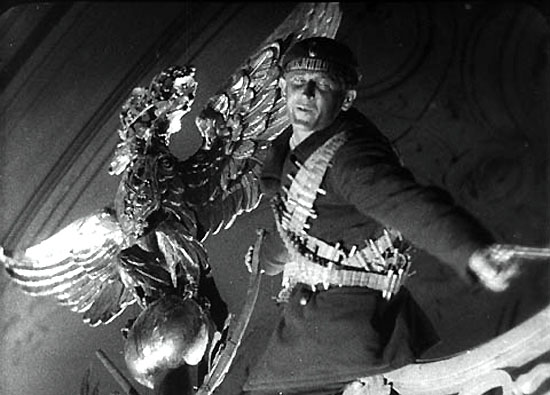
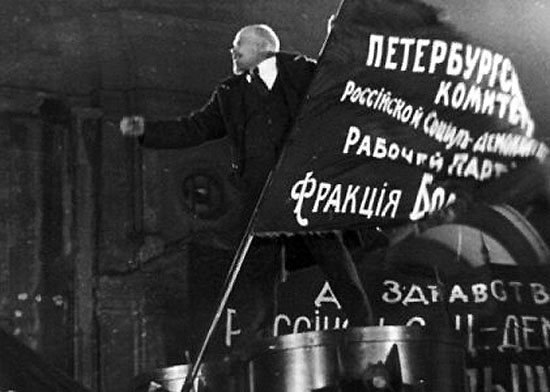
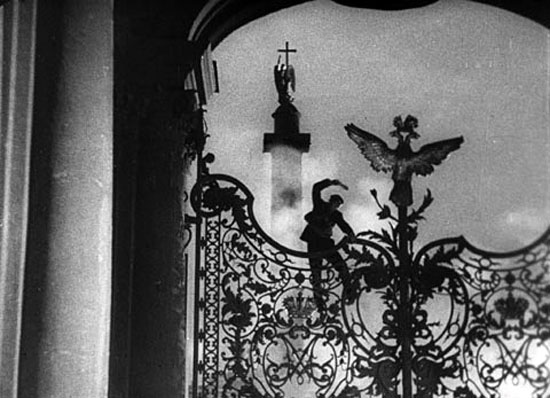
Borrowing its title from a book by American journalist John Reed (of Reds fame), Sergei Eisenstein's Ten Days That Shook the World
reenacts the crucial week-and-a-half in October, 1918, when the Russian Kerensky regime was toppled by the Bolsheviks. While Eisenstein
takes certain liberties in characterization--those opposing the Bolsheviks are depicted as mental defectives or grossly overweight clowns -
his re-creation of such events as the storming of the Winter Palace are painstakingly meticulous. The "actor" playing Lenin, a non-
professional worker named Nikandrov, so closely resembles the genuine article that the effect is positively eerie. So authentic is
Eisenstein's reconstruction of events that, for years, TV documentaries have been passing off clips from Ten Days That Shook the
World as "actual" scenes of the Revolution. While impressive on a technical level, the film never truly stirs the audience's emotions;
Eisenstein purists have argued that this "alienation" technique was the director's intention all along, forcing the viewer to observe the
events intellectually rather than emotionally. Produced in celebration of the tenth anniversary of the October Revolution, Ten Days That
Shook the World was initially titled October.
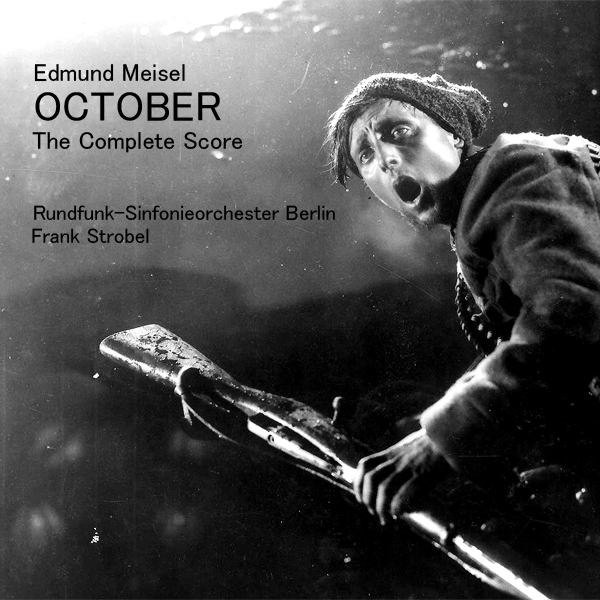
Music Composed by
Edmund Meisel
Played by the
Rundfunk-Sinfonieorchester Berlin
Conducted by
Frank Strobel
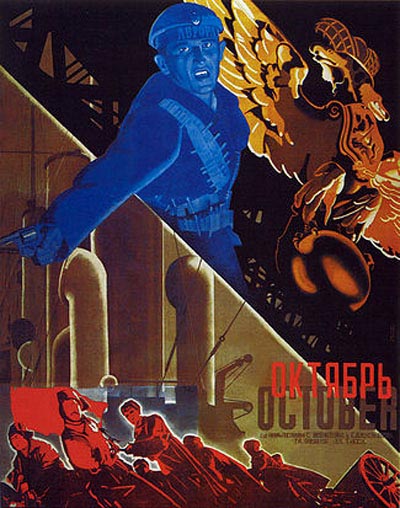
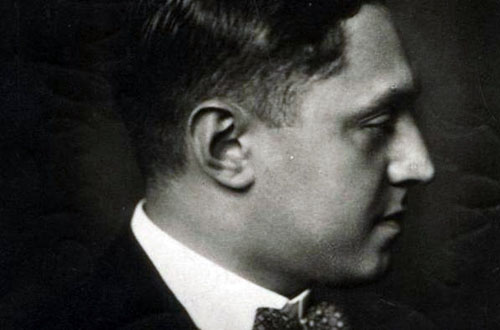
"A composer principally associated with the stage for much of his tragically short career, Vienna-born Edmund Meisel's
most prominent association was with theatrical director Erwin Piscator, and his work in the early '20s included writing
the incidental music for pieces by Bertholt Brecht. In 1925, the German distributor of Sergei Eisenstein's movie Battleship
Potemkin, seeking to capitalize on the movie's unexpected popularity in Berlin, decided to commission a new score to
replace the rather pedestrian music with which it had been released and was playing in theaters, and began looking for
a composer. Maria Andreova, the wife of Maxim Gorky, chanced to recommend Edmund Meisel. Working under siege
conditions, with just 12 days to compose and orchestrate his work, he generated a landmark movie score that astonished
everyone who heard it and delighted Eisenstein. Meisel would go on to score just a tiny handful more movies before
his death at the tragically young age of 36, in 1930 -- ironically, his music for Potemkin would get lost amid the transition
from silents to sound and not be heard again until the 1990s, when it was restored and the first full-fledged recordings
of his work released (on the Edel label). He has belatedly come to be recognized as the most important film composer
of the silent era and the father of the modern movie score."
Source: DVD, Deutsche Kinemathek (My rip!)
Format: FLAC(RAR), DDD Stereo
File Size: 637 MB
This is my own rip from the German DVD. The 119 minute score is divided into seven cues,
which should be played without pause. FLAC rip (DDD stereo). Please request the link in this thread.
PM's will be ignored. Limited sharing period.
which should be played without pause. FLAC rip (DDD stereo). Please request the link in this thread.
PM's will be ignored. Limited sharing period.
This is the second score that leading silent film composer Edmund Meisel provided for a Sergei Eisenstein film, and it's
just as powerful as the first, Battleship Potemkin (>here< (Thread 215810)). It was restored for the 2012 Berlinale festival.



Borrowing its title from a book by American journalist John Reed (of Reds fame), Sergei Eisenstein's Ten Days That Shook the World
reenacts the crucial week-and-a-half in October, 1918, when the Russian Kerensky regime was toppled by the Bolsheviks. While Eisenstein
takes certain liberties in characterization--those opposing the Bolsheviks are depicted as mental defectives or grossly overweight clowns -
his re-creation of such events as the storming of the Winter Palace are painstakingly meticulous. The "actor" playing Lenin, a non-
professional worker named Nikandrov, so closely resembles the genuine article that the effect is positively eerie. So authentic is
Eisenstein's reconstruction of events that, for years, TV documentaries have been passing off clips from Ten Days That Shook the
World as "actual" scenes of the Revolution. While impressive on a technical level, the film never truly stirs the audience's emotions;
Eisenstein purists have argued that this "alienation" technique was the director's intention all along, forcing the viewer to observe the
events intellectually rather than emotionally. Produced in celebration of the tenth anniversary of the October Revolution, Ten Days That
Shook the World was initially titled October.

Music Composed by
Edmund Meisel
Played by the
Rundfunk-Sinfonieorchester Berlin
Conducted by
Frank Strobel


"A composer principally associated with the stage for much of his tragically short career, Vienna-born Edmund Meisel's
most prominent association was with theatrical director Erwin Piscator, and his work in the early '20s included writing
the incidental music for pieces by Bertholt Brecht. In 1925, the German distributor of Sergei Eisenstein's movie Battleship
Potemkin, seeking to capitalize on the movie's unexpected popularity in Berlin, decided to commission a new score to
replace the rather pedestrian music with which it had been released and was playing in theaters, and began looking for
a composer. Maria Andreova, the wife of Maxim Gorky, chanced to recommend Edmund Meisel. Working under siege
conditions, with just 12 days to compose and orchestrate his work, he generated a landmark movie score that astonished
everyone who heard it and delighted Eisenstein. Meisel would go on to score just a tiny handful more movies before
his death at the tragically young age of 36, in 1930 -- ironically, his music for Potemkin would get lost amid the transition
from silents to sound and not be heard again until the 1990s, when it was restored and the first full-fledged recordings
of his work released (on the Edel label). He has belatedly come to be recognized as the most important film composer
of the silent era and the father of the modern movie score."
Source: DVD, Deutsche Kinemathek (My rip!)
Format: FLAC(RAR), DDD Stereo
File Size: 637 MB
This is my own rip from the German DVD. The 119 minute score is divided into seven cues,
which should be played without pause. FLAC rip (DDD stereo). Please request the link in this thread.
PM's will be ignored. Limited sharing period.

